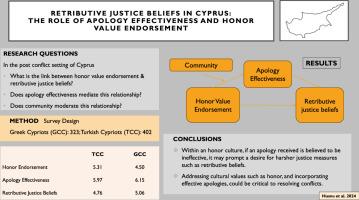Retributive justice beliefs in Cyprus: The role of apology effectiveness and honor value endorsement
IF 2.2
Current research in ecological and social psychology
Pub Date : 2025-01-01
DOI:10.1016/j.cresp.2025.100224
引用次数: 0
Abstract
Core social psychological processes including morality, punishment, and reciprocity can be significantly shaped by differences in cultural logics. Although the literature on the function of honor (as a cultural logic) in interpersonal relationships is expanding, little is known about how it may play a role in intergroup processes other than negative consequences, such as intergroup hostility. Examining the function of honor value endorsement in transitional justice is a promising direction. The current study investigates these dynamics while considering the role of apology effectiveness in Cyprus, a post-conflict society where honor beliefs are expected to shape interpersonal and intergroup processes. Apologies, while often considered an important prerequisite for forgiveness and reconciliation may also evoke complex reactions tied to revenge-seeking, or honor restoration. These factors complicate their effectiveness in transitional justice settings. This study aims to clarify how honor value endorsement shapes justice preferences and apology perceptions. We found evidence that the relationship between honor value endorsement and retributive justice beliefs was mediated by beliefs in the effectiveness of apologies (while controlling for trust and amount of positive contact), specifically in the Turkish Cypriot community. Results are discussed in light of the unique dynamics within the Cypriot context and underscore the importance of addressing cultural variations to achieve reconciliation and sustainable peace.

塞浦路斯的报应正义信念:道歉有效性与荣誉价值背书的作用
道德、惩罚和互惠等核心社会心理过程会受到文化逻辑差异的显著影响。尽管关于荣誉(作为一种文化逻辑)在人际关系中的作用的文献正在不断扩大,但除了负面后果(如群体间敌意)之外,它在群体间过程中如何发挥作用却知之甚少。考察荣誉价值背书在转型司法中的作用是一个很有前景的方向。当前的研究调查了这些动态,同时考虑了道歉有效性在塞浦路斯的作用,这是一个冲突后的社会,荣誉信仰被期望塑造人际关系和群体间的过程。道歉通常被认为是宽恕与和解的重要先决条件,但它也可能引发与寻求报复或恢复名誉有关的复杂反应。这些因素使其在过渡时期司法环境中的有效性复杂化。本研究旨在厘清荣誉价值背书如何塑造正义偏好与道歉知觉。我们发现证据表明,荣誉价值认可和报复性正义信念之间的关系是由对道歉有效性的信念介导的(同时控制信任和积极接触的数量),特别是在土族塞人社区。根据塞浦路斯情况下的独特动态讨论了结果,并强调了解决文化差异以实现和解与可持续和平的重要性。
本文章由计算机程序翻译,如有差异,请以英文原文为准。
求助全文
约1分钟内获得全文
求助全文
来源期刊

Current research in ecological and social psychology
Social Psychology
CiteScore
1.70
自引率
0.00%
发文量
0
审稿时长
140 days
 求助内容:
求助内容: 应助结果提醒方式:
应助结果提醒方式:


